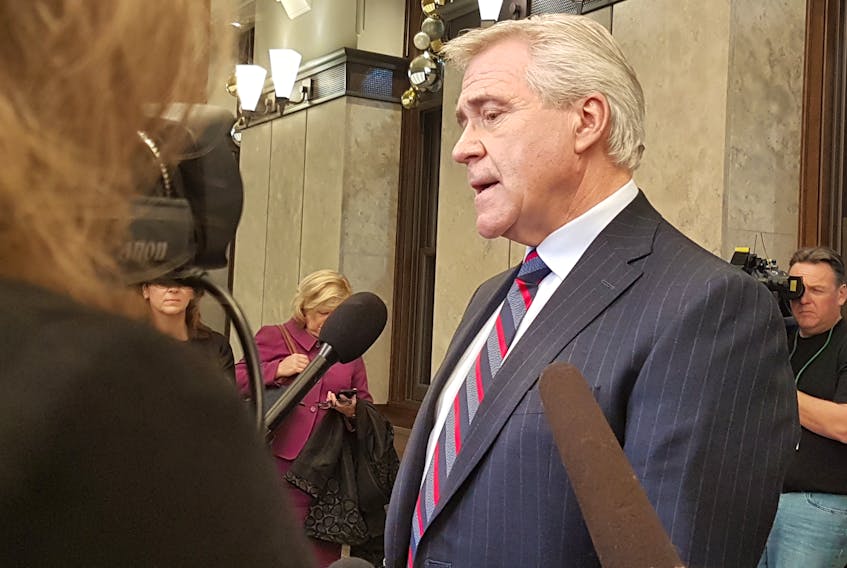OTTAWA, Ont. — Newfoundland and Labrador Premier Dwight Ball did not leave the Prime Minister’s office Tuesday with a $200-million cheque slated for power rate mitigation in his province.
But Ball said he is confident Prime Minister Justin Trudeau shares his commitment to ensuring energy rates remain stable for Newfoundlanders and Labradorians as the Muskrat Falls hydroelectric generating station comes online in 2021.
Ball is the fifth premier to have met with the prime minister since the federal election. Trudeau has also had meetings with P.E.I. Premier Dennis King, Ontario Premier Doug Ford, Manitoba Premier Brian Pallister and Saskatchewan Premier Scott Moe.
Speaking with reporters after the meeting, Ball danced around questions about specifics and concrete commitments related to rate mitigation.
He said the solution to ensuring Newfoundlanders and Labradorians continue to pay reasonable electricity rates isn’t as simple as Ottawa writing a $200-million cheque, but identifying a “bundle of options” that would be available to Newfoundland and Labrador to help with rate migration.
“What we want to have by the end of January is the ability to be able to say to people in Newfoundland and Labrador that rates will not be doubling.”
— Premier Dwight Ball
A total of $725.9 million annually is expected to be needed to stabilize power rates at about 13.5 cents per kilowatt hour — the Liberals’ target. In April, Ball announced a mitigation plan to achieve that, which included $200 million per year through collaboration with Ottawa, something that has yet to be formalized.
A final report from the province’s Board of Commissioners of Public Utilities, which will outline options to prevent the significant cost of the Muskrat Falls project from affecting Newfoundlanders and Labradorians, is expected in January 2020.
“What we want to have by the end of January is the ability to be able to say to people in Newfoundland and Labrador that rates will not be doubling,” Ball told reporters. “We can say that now, but specifically we will be able to drill that down and say, ‘it will be option one, two or three.’ We're not there yet, but certainly the commitment from the prime minister has been unwavering.”
Ball said while electricity rates are expected to stabilize over time, immediate intervention is needed to get to that point and avoid a spike in rates.
He said there are many dedicated officials working on the issue behind the scenes.
In addition to rate mitigation, Ball said he and Trudeau discussed pharmacare. Ball said he believes the provinces are looking for clarity and a commitment from Ottawa to a program that is sustainable and will not eventually get offloaded on the provinces.
Ball said he is seeing growing demands on pharmacare in Newfoundland and Labrador due to an aging population and high rates of chronic diseases.
“Right now we need more support from the federal government on pharmaceuticals and medications that (Canadians) vitally need to control and maintain chronic disease management within their own home,” he said.

Address national unity
With the first meeting of the Council of the Federation since the October election set for Dec. 2, Ball also spoke about the need for national unity in the face of a growing sense of alienation in the Western provinces.
Ball says he doesn't want to see a divided Canada, and he takes any concerns about national unity seriously.
“This is too good of a country to give up on, and I think premiers across this country, regardless of where you are, we recognize that first and foremost.”
Ball also said it’s important for him to work with provinces like Alberta because there are a lot of similarities between their economies, and because the Newfoundland and Labrador economy is linked to Alberta’s, as many Newfoundanders go there to work.
Today I met with Prime Minister @JustinTrudeau in Ottawa to advance discussions on rate mitigation. Electricity rates will not double as progress is being made on the prevention of doubling rates though a bundle of options. My statement: https://t.co/vVwh98yO3m #nlpoli #cdnpoli pic.twitter.com/GhGkHr7VMv
— Premier of NL (@PremierofNL) November 26, 2019
Although much of the focus of the national discussion has been around equalization payments, Ball said the focus should be instead placed on things like natural resource development and on other more flexible options and programs to support provinces that face challenges.
One option he mentioned specifically is the federal fiscal stabilization program, a program that enables the federal government to provide financial assistance to any province faced with a year-over-year decline in its non-resource revenues greater than five per cent.
“What we need is a broader discussion on how do we respond to the financial challenges that provinces like Newfoundland and Labrador, a natural resource developing province, (are facing),” he said,
“Rather than pick a fight with each other … and say, ‘I want you to have less so we can have more,’ I think we can be responsible enough to put together a new program that reflects our needs.”
.@PremierofNL and I will keep working together to make life better and more affordable for Newfoundlanders & Labradorians. Today we talked about investing in health care & pharmacare, energy, and important infrastructure projects. Thanks for the meeting, Dwight. pic.twitter.com/63yDVXlWu1
— Justin Trudeau (@JustinTrudeau) November 26, 2019
Despite being one of the only Liberal premiers in the country, along with Nova Scotia Premier Stephen McNeil and Yukon Premier Sandy Silver, Ball said he will not go into what is expected to be a contentious premiers meeting wearing his party stripe.
“I don't walk in there in any colour shirt, I walk in there wearing a Canadian jersey with a Newfoundland and Labrador label on it,” he said.
“I want to see this country survive.”
The Council of Atlantic Premiers also met via a conference call during which, according to a joint news release, they discussed their shared priorities heading into next week’s meetings.
Those priorities include federal-provincial relations, health-care funding, pharmacare, labour and immigration, and natural resource development, including Atlantic Canada's role as a leader in clean energy.
RELATED:









